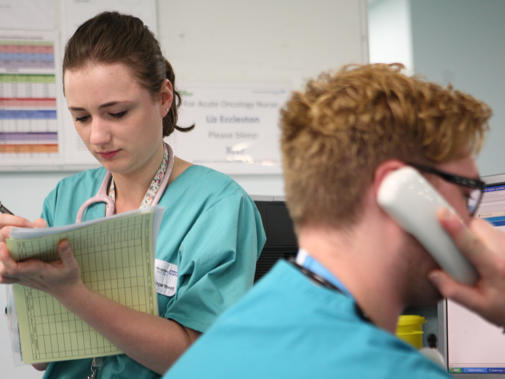Kelly Clarkson has just won the first season of American Idol, The Lord of the Rings: The Two Towers has smashed the box office worldwide, and Nickelback have just released ‘How you remind me’. Yes, the year is 2002, and that is when our contract was last negotiated.
Twenty-one years on, the provision of medical care and medical education has changed drastically within Northern Ireland. However, junior doctors remain on this antiquated contract.
A contract that no longer recognises the range of complex co-morbid patients we now treat. A contract that doesn’t recognise that living standards have fallen exponentially, while the pressures of the job have changed and increased significantly.
We no longer work as a ‘firm’ but instead cross-cover numerous wards. Instead of doing 48 to 72 hours on call, we work more shift work hours with more intense workloads when we are in work.
Our contract no longer rewards junior doctors appropriately or fairly for their hard work. We are the lowest paid group of doctors in the UK, with arguably the worst terms and conditions.
There is no ‘exception reporting’ in Northern Ireland unlike the rest of the UK, and the current contractual safeguard of rota monitoring isn’t working for junior doctors. It is seen by many trainees as a tick-box exercise that they have lost faith in, doing little to prevent the regular occurrence of working significant additional hours without fair recompense.
We also have no Guardian of Safe Working in Northern Ireland which is in place in England and oversees compliance with the safeguards of the 2016 contract and acts as a champion of safe working hours for junior doctors.
We lack the safeguards which junior doctors working in Scotland have built into their current contract such as no more than seven consecutive shifts, and the ban on doing more than four consecutive shifts longer than 10 hours in any seven-day period.
We also lack the pay increase which Scotland has recently secured, alongside the Scottish government's commitment to address pay erosion and negotiate a new contract for Scotland over the next few years. Instead we have seen our pay eroded in real times with sub inflationary pay awards for many years since 2008, with a contract which doesn’t work for trainees!
The existing contract does not match the reality of training in 2023. A new contract is needed urgently, one that creates a fair and safe working environment, conducive to training and one that incentivises junior doctors to stay and work in Northern Ireland.
The Department of Health, the secretary of state for Northern Ireland, and our Assembly, need to value their junior doctors. There needs to be a commitment from them to enter contract negotiations in good faith with the aim of improving our workplace protections, facilities, working hours, recognition and pay to ensure that doctors continue to choose Northern Ireland as their place of work, and to help stabilise our healthcare system.
If there is a failure to act immediately, there will be a further brain drain of our junior doctors to the rest of the UK, and the Republic of Ireland, where junior doctors have better terms and conditions of employment.
The author is a junior doctor working in Northern Ireland

